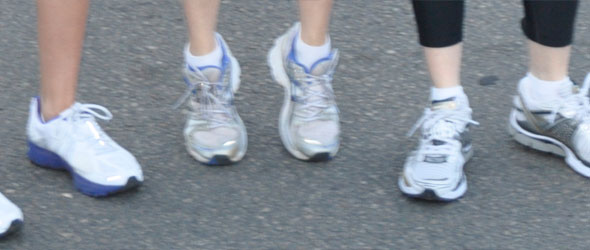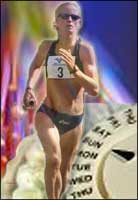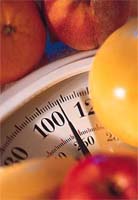Amenorrhea is the medical term which refers to a prolonged absence of menstruation during the reproductive years of a woman for reasons other than pregnancy. Exercise is well known to affect the menstruation cycle, although it is not fully known how.
Running and Amenorrhea
Many women believe they have stopped menstruating just because they are exercising too much. However, this is not true because there are also very thin athletes who exercise very heavily which have regular periods. Another popular belief is that if you are too thin your periods stop. This is also false, as studies have shown that there are no differences in body fat between athletic women who do and do not menstruate regularly.
What is fact, is that the cessation of periods is commonly related to nutrition loss of body fat, stress, and changes in the amount of body hormones. Anorexic females are known to experience amenorrhea. Although amenorrhea exists among women with no eating disorders, the loss of periods is certainly a red flag warning that restrictive, anorectic type eating behaviors might be the culprit, and coaches should beware of this when coaching the teenage age group who are especially vulnerable towards anorexic behaviour.
Irregularities in the menstrual cycle happen more often with running than with any other sport. The amount of running also plays a role. Some women who run more than 20-30 miles per week may find that they stop having periods. More will notice this at 40-60 miles per week. When the mileage is reduced, the normal menstrual cycle usually resumes. A woman should never assume that menstrual changes are related to exercise-you can’t tell the cause without a thorough checkup. If your periods stop, you should see your doctor. You can keep exercising unless your doctor advises against it.
Although some women deem amenorrhea as a desirable side effect of exercise because they no longer have to deal with the hassles and possible discomfort of monthly menstrual periods, it must be recognized that the absence of periods is linked with health problems. One major health problem is the loss of calcium from the bones, with almost a three times higher incidence of stress fractures (24% of athletes with no or irregular periods experience stress fractures as compared to only 9% of regularly menstruating athletes); and, long-term problems with osteoporosis starting at an early age. Amenorrhea can also interfere with the ability to fall pregnant easily should the athlete want to start a family.
Other articles in this section related to the Women’s menstrual cycle:
- Periods – Running Red Days
- Does your period affect your running?
- When is the best time of the month to run a race?
- Does running help alleviate premenstrual symptoms?
- Why does running sometimes stop periods?
- What’s the best sanitary wear for running?
- How does running affect contraception and infertility?
- Are runners at an elevated risk for osteoporosis?
Who is Cassandra Davis head of the Women’s section ? | Cass |
































